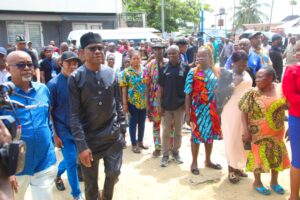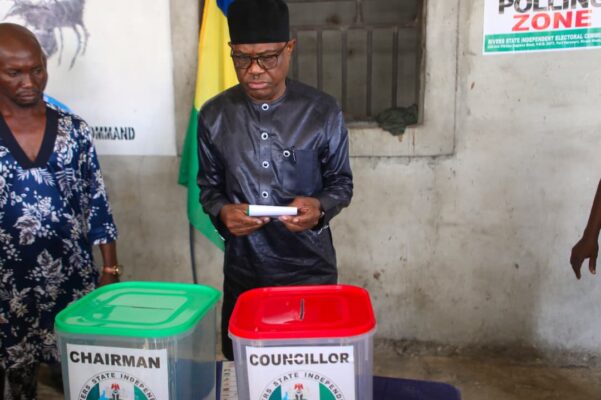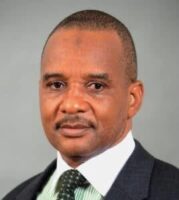Minister of the Federal Capital Territory (FCT), Nyesom Wike, on Saturday expressed deep satisfaction with the conduct of the Rivers State local government elections, describing the process as credible, lawful, and a crucial step toward stabilizing grassroots governance.
Wike, who voted at his polling unit in Rumuepirikom, Obio/Akpor Local Government Area, hailed President Bola Tinubu for ensuring that the election was held, noting that the exercise aligns with the Supreme Court’s directive abolishing caretaker committees in local government administration.
According to him, without democratically elected councils, funds from the Federation Account cannot flow to local government accounts, creating governance gaps at the grassroots. “Since the Supreme Court has said there is nothing like caretaker committees in local governments, if there are no elected people, funds will not come from the Federation Accounts to the local government accounts,” Wike told journalists shortly after casting his ballot. “So, if the emergency rule is lifted and there is no local government election, we will still have the same problem. That is why we must thank Mr President for making sure that this election is conducted.”
 Commends Voter Turnout and RSIEC
Commends Voter Turnout and RSIEC
The former Rivers governor also praised the Rivers State Independent Electoral Commission (RSIEC) for what he described as a successful and orderly poll. He lauded residents for coming out in large numbers, particularly in residential areas, to exercise their franchise. “This is my community, I can see the turnout of people in this particular unit, so it is in other units,” he said. “When you go to commercial areas, you don’t expect a large turnout of people but when you go to residential areas, of course, you expect people to turn out. Rivers people are happy to have their own people contesting elections, so I’m very happy with the turnout.”
Wike disclosed that reports reaching him from rural communities also indicated robust participation, a development he said proves the willingness of Rivers people to strengthen democracy at the grassroots.
On Supreme Court Fears
Wike dismissed concerns that the polls could face legal challenges at the Supreme Court, insisting that the exercise was conducted within the framework of the law. “There was no election by law before; the Supreme Court said there was no election. Today we are holding an election, and that is why you see people coming out to cast their votes,” he argued. “If you do something that is not known to law, of course, it will be set aside. But now that the process is very clear and known to law, nobody is worried. All the people are doing is just to come out and cast their votes for whoever they want to represent them at the local government.”
Read Also
- Abdulrahman-led PDP NCWC hails Court judgment nullifying Ibadan Convention
- Abuja Residents Rally Behind Wike, Reject Calls for Minister’s Removal
- We've Cleared 10 Out Of 14 Demands Of Striking FCTA Workers - Lere Olayinka
- PANDEF Sets Up High-Level Reconciliation Committee to Resolve Rivers Political Crisis
Grassroots Stability and Direct Funding
The minister emphasized that the successful conduct of the polls would guarantee local governments direct access to their statutory allocations, in line with the recent Supreme Court judgment on financial autonomy for councils.
He said this development would strengthen service delivery at the grassroots and prepare Rivers State for a smooth transition once the emergency rule imposed in the state is lifted in September. “Everybody must stand out to support this particular election in order to stabilize the grassroots level. By the time the emergency rule is lifted in September, it means that the governor and state Assembly will come back, so without local government, it would not have been complete,” Wike noted. “By the end of the day, elected people will emerge, be sworn in, and we will know that we have elected representatives at the grassroots level.”
A Crucial Moment for Rivers Democracy
Wike’s remarks underscore the wider significance of Saturday’s exercise, coming at a time when Rivers politics has been defined by legal tussles, emergency rule, and power struggles. The successful conduct of the LG polls, observers say, not only restores democratic order at the grassroots but also sets the tone for broader reconciliation in the state’s political landscape.
By aligning with the Supreme Court’s ruling, the election has paved the way for local governments to function with legitimacy, access funding, and deliver services directly to the people.
For Wike, it was also an opportunity to reaffirm his loyalty to President Tinubu, while positioning himself as a defender of grassroots democracy in his home state.





